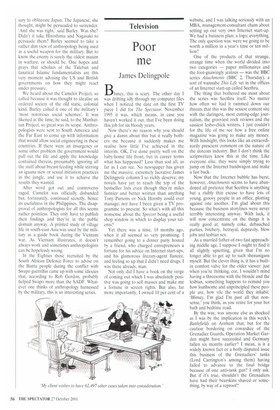Poor me
James Delingpole
Blimey, this is scary. The other day I was drifting idly through my computer files when I noticed the date on the first TV piece I did for The Spectator. November 1995 it was, which means, in case you haven't worked it out, that I've been doing this job for six bloody years.
Now there's no reason why you should give a damn about this but it really bothers me because it suddenly makes me realise how little I've achieved in the interim. OK, I've done pretty well on the baby/home life front, but in career terms what has happened? Less than sod all, as far as I can see. No newspaper has given me the massive, extremely lucrative James Delingpole column I so richly deserve; my novels have yet to reach the top of the bestseller lists even though they're miles funnier and better written than anything Tony Parsons or Nick Hornby could ever manage; nor have I been given a TV programme to present. So what's with all this nonsense about the Speccer being a useful shop window in which to display your talents?
Yet there was a time, 18 months ago, when it all seemed so very promising. I remember going to a dinner party hosted by a friend, who charged entrepreneurs a fortune for his advice on Internet start-ups, and his glamorous literary-agent fiancee, and feeling so up that I didn't need drugs. I was there already, man.
Not only did I have a book on the verge of coming out which I was absolutely positive was going to sell masses and make me a fortune in screen rights. But also, far more importantly, I owned 10 per cent of a
website, and I was talking seriously with an MBA, management-consultant chum about setting up our very own Internet start-up. We had a business plan; a logo; everything. The only question was: were we going to be worth a million in a year's time or ten million?
One of the products of that strange, strange time when the world divided into two categories — paper millionaires and the foot-gnawingly jealous — was the BBC series Attachments (BBC 2, Thursday), a sort of wannabe This Life set in the offices of an Internet start-up called Seethru.
The thing that bothered me most about the series was Seethru itself. No matter how often we had it rammed down our throats that this was the sexiest content site with the daringest, most cutting-edge journalism, the grooviest rock reviews and the sassiest lesbo-chick writers, I just couldn't for the life of me see how a free online magazine was going to make any money. With hindsight, this looks like an extraordinarily prescient comment on the nature of the dotcom industry. But I don't think the scriptwriters knew this at the time. Like everyone else, they were simply trying to jump on the Internet bandwagon and make a fast buck.
Now that the Internet bubble has burst, however, Attachments seems to have abandoned all pretence that Seethru is anything but a risibly thin excuse to have lots of young, groovy people in an office, plotting against one another. I'm glad about this because the business storylines were never terribly interesting anyway. With luck, it will now concentrate on the things it is really good at, namely coke, debauched parties, bitchery, betrayal, depravity, blow jobs and lesbian sex.
As a married father-of-two fast approaching middle age, I suppose I ought to find it all slightly upsetting, given that I'm no longer able to get up to such shenanigans myself. But the clever thing is, it has a builtin comfort valve for the older viewer: just when you're thinking, cor, I wouldn't mind having a threesome with the blonde and the lesbian, something happens to remind you how loathsome and unprincipled these people are, how vile the world they inhabit. `Blimey, I'm glad I'm past all that nonsense,' you think, as you retire for your hot bath and bedtime read.
By the way, was anyone else as shocked as J was by the implication in this week's Battlefields on Arnhem that, but for the caution bordering on cowardice of the Grenadier Guards, Operation Market Garden might have succeeded and Germany fallen six months earlier? I mean, is it a widely known fact or a hotly disputed issue this business of the Grenadiers' tanks (Lord Carrington's among them) having failed to advance to the final bridge because of one anti-tank gun? I only ask. But if it's true, shouldn't the Grenadiers have had their bearskins shaved or something, by way of a reproof?










































































 Previous page
Previous page